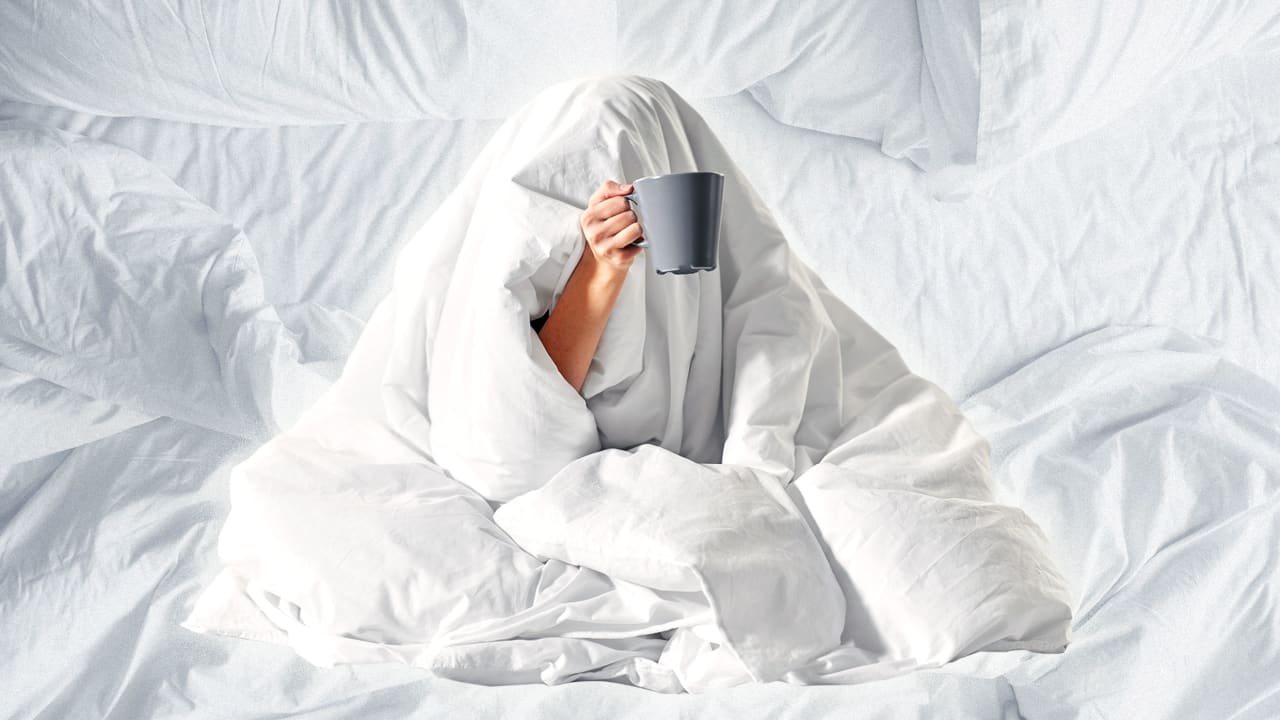Do you ‘hurkle-durkle’? Here’s why it’s not always a good idea
Recently, an ear infection and subsequent case of hives kept me in bed for a week. The first few days, I was tired and told myself to rest. But the rest of the week? Well, I enjoyed staying in bed, drinking coffee, and lingering over Wordle, Spelling Bee, and emails. So, the following week, I stayed in bed a little longer than usual, too. Turns out, I was hurkle-durkling. Hurkle-durkle is a Scottish term that originated in the 1800s. It means “to lounge in bed when you should be up and about.” While it was meant to be judgmental, it became a TikTok self-care trend with mindful mornings that prioritize mental health over productivity. In the U.S., the practice goes one step further. Bed rotting, a term added to Dictionary.com in 2024, refers to spending the entire day in bed under the guise of self-care. According to a recent survey by the mattress manufacturer Amerisleep, nearly three in five Americans hurkle-durkle. Gen Zers have embraced the practice, with four out of five choosing to hang out in bed; and women are 23% more likely than men to hurkle-durkle. It’s Not All Dreamy, Though While lounging in bed for several minutes or even hours sounds like a wonderful indulgence, it can have unintentional negative consequences. In the Amerisleep survey, non-hurkle-durklers reported better mental health, physical health, and sleep quality than hurkle-durklers. For example, 48% of non-hurkle-durklers reported feeling satisfied with their careers, compared to 42% of hurkle-durklers. (Of course, it’s not clear that hurkle-durkling is the only cause. If you feel less satisfied with your job, you might be less inclined to get out of bed.) A more structured morning routine can help set a positive tone for the day, explains April Mayer, Amerisleep’s sleep expert. “Those who get out of bed promptly upon waking might feel a sense of accomplishment, which could lead to improved motivation and mental clarity throughout the day,” she says. The survey also found that people who hurkle-durkle are five times more likely to procrastinate than those who don’t. That’s because lingering in bed can make it harder to transition into an active mindset, says Mayer. “We found that those who stay in bed long after waking are significantly more likely to delay responsibilities,” she says. “Additionally, delaying the start of the day may reinforce avoidance behaviors, making it easier to put off tasks and harder to build productive momentum.” I have to admit that I felt this myself. For a week, I felt off. It was harder to get back into a productive mindset. I told myself it was the after-effect of antibiotics. Possible. It’s also possible it was the tone I had set for the day. Finding the Balance Instead, Mayer recommends finding a balance between a gentle wake-up and excessive lounging. “According to our findings, most people who stay in bed for around 5 to 10 minutes after waking don’t experience negative impacts, but those who remain for 20 to 30 minutes or longer may struggle with procrastination and decreased productivity,” she says. “A brief period of wakeful relaxation can help ease into the day, but too much lingering may disrupt morning routines and make it harder to feel energized.” What you do while lingering in bed also matters. “Technically, checking emails in bed is an activity, but it’s not necessarily productive,” says Mayer. “If it leads to immediate action, like responding to urgent messages, it might be useful. However, if it turns into mindless scrolling or stress-inducing work thoughts before fully waking up, it could be counterproductive. Establishing boundaries—such as waiting until you’re out of bed to check emails—can help create a healthier morning routine.” I also found myself working in bed. While it’s convenient, Mayer says it could negatively affect my sleep quality and focus because it blurs the line between rest and productivity. “Spending excessive time in bed outside of sleep can disrupt circadian rhythms, making it harder to fall asleep at night,” she says. “Working in bed can signal to the brain that the bed is a workspace rather than a place for relaxation, potentially leading to poor sleep hygiene.” Thankfully, there are ways to start the day that also create the self-care you crave. For example, Mayer recommends doing some slow stretching exercises, such as toe touches or easy torso twists. You could also sit quietly for five minutes, focusing on your breathing. A brief mindful relaxation practice can serve as a gentle transition into the day. “The goal isn’t to eliminate comfort and rest from our mornings,” Mayer says. “It’s to create intentional routines that energize us for the day ahead.”

Recently, an ear infection and subsequent case of hives kept me in bed for a week. The first few days, I was tired and told myself to rest. But the rest of the week? Well, I enjoyed staying in bed, drinking coffee, and lingering over Wordle, Spelling Bee, and emails. So, the following week, I stayed in bed a little longer than usual, too.
Turns out, I was hurkle-durkling.
Hurkle-durkle is a Scottish term that originated in the 1800s. It means “to lounge in bed when you should be up and about.” While it was meant to be judgmental, it became a TikTok self-care trend with mindful mornings that prioritize mental health over productivity. In the U.S., the practice goes one step further. Bed rotting, a term added to Dictionary.com in 2024, refers to spending the entire day in bed under the guise of self-care.
According to a recent survey by the mattress manufacturer Amerisleep, nearly three in five Americans hurkle-durkle. Gen Zers have embraced the practice, with four out of five choosing to hang out in bed; and women are 23% more likely than men to hurkle-durkle.
It’s Not All Dreamy, Though
While lounging in bed for several minutes or even hours sounds like a wonderful indulgence, it can have unintentional negative consequences. In the Amerisleep survey, non-hurkle-durklers reported better mental health, physical health, and sleep quality than hurkle-durklers. For example, 48% of non-hurkle-durklers reported feeling satisfied with their careers, compared to 42% of hurkle-durklers. (Of course, it’s not clear that hurkle-durkling is the only cause. If you feel less satisfied with your job, you might be less inclined to get out of bed.)
A more structured morning routine can help set a positive tone for the day, explains April Mayer, Amerisleep’s sleep expert. “Those who get out of bed promptly upon waking might feel a sense of accomplishment, which could lead to improved motivation and mental clarity throughout the day,” she says.
The survey also found that people who hurkle-durkle are five times more likely to procrastinate than those who don’t. That’s because lingering in bed can make it harder to transition into an active mindset, says Mayer.
“We found that those who stay in bed long after waking are significantly more likely to delay responsibilities,” she says. “Additionally, delaying the start of the day may reinforce avoidance behaviors, making it easier to put off tasks and harder to build productive momentum.”
I have to admit that I felt this myself. For a week, I felt off. It was harder to get back into a productive mindset. I told myself it was the after-effect of antibiotics. Possible. It’s also possible it was the tone I had set for the day.
Finding the Balance
Instead, Mayer recommends finding a balance between a gentle wake-up and excessive lounging. “According to our findings, most people who stay in bed for around 5 to 10 minutes after waking don’t experience negative impacts, but those who remain for 20 to 30 minutes or longer may struggle with procrastination and decreased productivity,” she says. “A brief period of wakeful relaxation can help ease into the day, but too much lingering may disrupt morning routines and make it harder to feel energized.”
What you do while lingering in bed also matters. “Technically, checking emails in bed is an activity, but it’s not necessarily productive,” says Mayer. “If it leads to immediate action, like responding to urgent messages, it might be useful. However, if it turns into mindless scrolling or stress-inducing work thoughts before fully waking up, it could be counterproductive. Establishing boundaries—such as waiting until you’re out of bed to check emails—can help create a healthier morning routine.”
I also found myself working in bed. While it’s convenient, Mayer says it could negatively affect my sleep quality and focus because it blurs the line between rest and productivity.
“Spending excessive time in bed outside of sleep can disrupt circadian rhythms, making it harder to fall asleep at night,” she says. “Working in bed can signal to the brain that the bed is a workspace rather than a place for relaxation, potentially leading to poor sleep hygiene.”
Thankfully, there are ways to start the day that also create the self-care you crave. For example, Mayer recommends doing some slow stretching exercises, such as toe touches or easy torso twists. You could also sit quietly for five minutes, focusing on your breathing. A brief mindful relaxation practice can serve as a gentle transition into the day.
“The goal isn’t to eliminate comfort and rest from our mornings,” Mayer says. “It’s to create intentional routines that energize us for the day ahead.”












































































































![Building A Digital PR Strategy: 10 Essential Steps for Beginners [With Examples]](https://buzzsumo.com/wp-content/uploads/2023/09/Building-A-Digital-PR-Strategy-10-Essential-Steps-for-Beginners-With-Examples-bblog-masthead.jpg)















![How to Use GA4 to Track Social Media Traffic: 6 Questions, Answers and Insights [VIDEO]](https://www.orbitmedia.com/wp-content/uploads/2023/06/ab-testing.png)



































